1997 Toyota 4Runner Tires, Repair & Service
Get Started
Complete Auto Care for Your 1997 Toyota 4Runner
-
TIRES FOR YOUR 1997 Toyota 4Runner View Tire Info GET TIRE PRICING
-
REPAIR FOR YOUR 1997 Toyota 4Runner View Repair Info SCHEDULE REPAIR
-
MAINTENANCE FOR YOUR 1997 Toyota 4Runner View Maintenance Info SCHEDULE MAINTENANCE
-
OFFERS FOR YOUR 1997 Toyota 4Runner Limited Time Tire Offers VIEW ALL COUPONS
1997 Toyota 4Runner Tires
Recommended Tires | Tire Information
1997 Toyota 4Runner Tires Sizes, Speed Ratings, and Inflation
Not sure about your 1997 Toyota 4Runner tire size? Use the following chart to find information on tire size, speed rating, and inflation.
| Trim Level | Speed Rating | Inflation in PSI F/R | Tire Size |
|---|---|---|---|
| 1997 Toyota 4Runner Base* | S | 29 PSI/29 PSI | P225/75R15 |
| 1997 Toyota 4Runner Base* | S | 32 PSI/32 PSI | P265/70R16 |
| 1997 Toyota 4Runner SR5* | S | 29 PSI/29 PSI | P225/75R15 |
| 1997 Toyota 4Runner SR5* | S | 32 PSI/32 PSI | P265/70R16 |
| 1997 Toyota 4Runner Limited* | S | 32 PSI/32 PSI | P265/70R16 |
| 1997 Toyota 4Runner Limited* | S | 29 PSI/29 PSI | P225/75R15 |
|
1997 Toyota 4Runner Base* Speed Rating: S Inflation F/R: 29 PSI/29 PSI |
|
1997 Toyota 4Runner Base* Speed Rating: S Inflation F/R: 32 PSI/32 PSI |
|
1997 Toyota 4Runner SR5* Speed Rating: S Inflation F/R: 29 PSI/29 PSI |
|
1997 Toyota 4Runner SR5* Speed Rating: S Inflation F/R: 32 PSI/32 PSI |
|
1997 Toyota 4Runner Limited* Speed Rating: S Inflation F/R: 32 PSI/32 PSI |
|
1997 Toyota 4Runner Limited* Speed Rating: S Inflation F/R: 29 PSI/29 PSI |
* Note: these models have different tire sizes depending on vehicle options.
Recommended Tires for Your 1997 Toyota 4Runner
What tires are best for a 1997 Toyota 4Runner? Check out the following tire brands and types.
 ALENZA AS ULTRA
ALENZA AS ULTRA
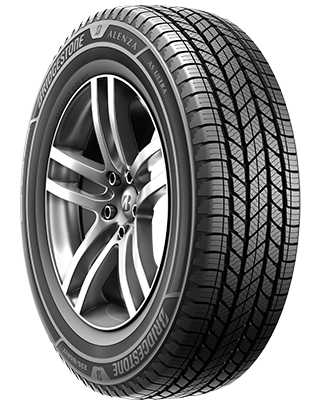
- No warranty
- All-Season
- Light Truck Tires
 Blizzak DM-V2
Blizzak DM-V2
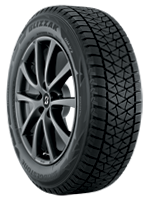
- No warranty
- Winter
- Winter
 Dueler A/T Revo 3
Dueler A/T Revo 3
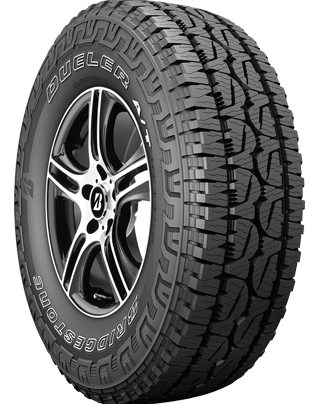
- Platinum Pact Limited Warranty
- All-Season
- Light Truck Tires
 Destination LE3
Destination LE3
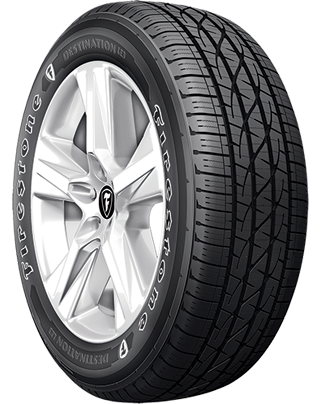
- No warranty
- All-Season
- Light Truck Tires
 Destination A/T2
Destination A/T2
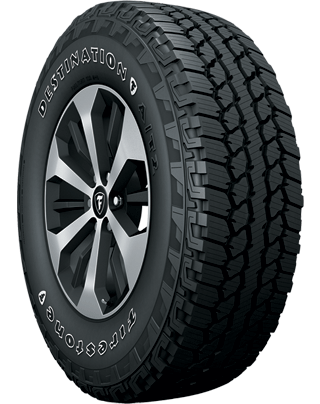
- Gold Pledge Limited Warranty
- All-Season
- Light Truck Tires
 Winterforce 2 UV
Winterforce 2 UV
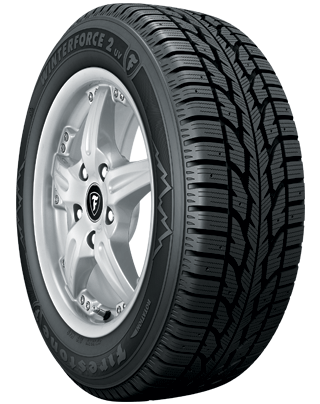
- No warranty
- Winter
- Winter

- No warranty
- All-Season
- Passenger Tires
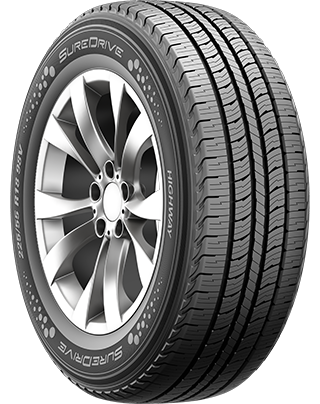
- No warranty
- All-Season
- Light Truck Tires
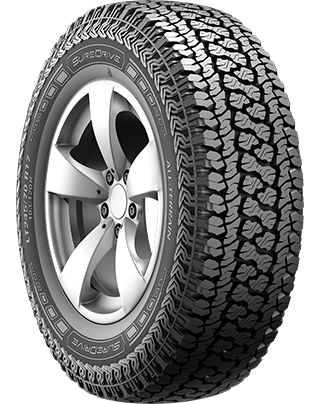
- No warranty
- All-Season
- Light Truck Tires
 Extensa A/S II
Extensa A/S II

- No warranty
- All-Season
- Passenger Tires
 OPEN COUNTRY A/T III
OPEN COUNTRY A/T III
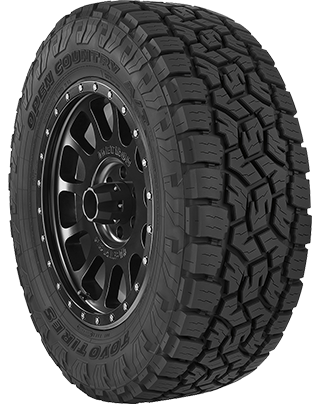
- No warranty
- All-Season
- Light Truck Tires
About 1997 Toyota 4Runner Tires
Apart from finding the right tire size, there are a couple of other factors to consider when buying Toyota 4Runner tires like where and how you drive, and what tire brand you trust most. Think about where you live (countryside vs. city vs. mountains) and the kind of unexpected weather you're likely to experience when evaluating your driving conditions. Many drivers who live in states that experience all four seasons choose to purchase two sets of tires: one set for winter, one set for summer. Other drivers prefer the convenience of all-season tires. They make one trip to the tire shop and they're pretty much ready for rain, light snow, or sun!
Your personal driving style is the next factor to consider. If you're an avid off-roader who yearns to pioneer new paths, you have very different tire needs than a highway commuter who doesn't hit the hills very often. Talk to a tire technician at Firestone Complete Auto Care for help choosing the best tire for you, or start shopping for Toyota 4Runner tires online.
Toyota 4Runner Installation and More
Firestone Complete Auto Care has been a leading tire provider for more than a century. We're your tire shop and a complete service center for tire installation, maintenance, repair, rotation, and alignment! We make it easy to buy new 1997 Toyota 4Runner tires online and book an installation appointment at the same time.
1997 Toyota 4Runner Tire Q&A
-
Why check Toyota tire inflation? The right tire pressure can make all the difference. Proper tire inflation helps increase fuel economy, improve braking time, and boost tire lifespan! Even a small change in tire pressure can impact your driving.
-
What do the tire sidewall numbers mean for my Toyota 4Runner? Your tire sidewall gives you information about load carrying capacity, speed rating, treadwear, traction, and tire size. Talk to one of our tire technicians to learn how to read the numbers on your tire!
-
How do I check the tread depth on my Toyota tires? Stay on top of your tire tread depth to help avoid a dangerous drive. You can check tread depth with a penny. Hold the penny so that Abraham Lincoln is facing you, then place your penny into a tread groove upside down. If you can see the top of Abe’s head, your tread is shallow and it might be time for new Toyota 4Runner tires. Grab a penny. Hold the so that Abe Lincon's head is facing you and his hair is pointing toward the ground. Then, place the penny into a tread groove. If you can see the top of Abe’s head, your tread is shallow and it might be time for new Toyota 4Runner tires.
Repair Services for Your 1997 Toyota 4Runner
How do I learn more about auto repairs? Click on a service below to read about the types of Toyota 4Runner repairs we do at Firestone Complete Auto Care.
Get Repairs for Your 1997 Toyota 4Runner
For most drivers, the words “car repair” don’t exactly spark excitement. But at Firestone Complete Auto Care, we strive to give you the excellent repair experience you deserve. Bring your 1997 Toyota 4Runner in for repair services and rest easy knowing that your 4Runner is in capable hands. We’ll start by assessing what repairs may be needed, and we’ll provide you with a detailed explanation of what we recommend. We’ll never recommend a repair we don’t think is necessary for your safety or the performance of your Toyota.
How Much Does Toyota 4Runner Repair Cost?
The cost to repair your 1997 Toyota 4Runner depends on which repairs are needed, costs of replacement parts or repair supplies, the labor involved, and the state you live in. No matter what state you’re in, be sure to look through our offers and online coupons for repairs.
A few different aspects can influence repair costs for your 1997 Toyota 4Runner, like
1997 Toyota 4Runner Auto Repair Questions
-
Do I need to follow Toyota's maintenance schedule? One of the best ways to prevent 1997 Toyota 4Runner repairs is by staying on top of your Toyota maintenance schedule. This schedule is written by the people who made your vehicle and they know best how to keep it running smoothly.
-
What's wrong if something feels 'off' in my Toyota? No, we’re not talking about finding the best jams on the radio! You know your car best, and you’re the first person who will notice if something doesn’t feel right (like new smells, sights, or sounds coming from your car). If you sense that something is 'off,' stop in for a Courtesy Check to have these symptoms checked out ASAP. Early action could help you prevent Toyota 4Runner repairs.
-
Are the repairs you recommend for my Toyota actually needed? Talk to your technician. We'll never recommend a service or repair for your 1997 Toyota 4Runner that we don't think is necessary for your safety.
Brake Repair for Your 1997 Toyota 4Runner
Your Toyota 4Runner may be powered by a strong engine. But if you can’t brake, it might as well be scrap metal. If you’re experiencing squeaky brakes or a loss of braking power, don’t wait! Safe driving is difficult when your brakes are anything but their best. Plus, ignoring your brake problems can result in more damage and higher brake repair bills. Visit Firestone Complete Auto Care for the right brake repair for your 1997 Toyota 4Runner. Our brake repair services include brake pad/shoe replacement, rotor/drum resurfacing, brake fluid exchange, and brake caliper and wheel cylinder installation.
Toyota 4Runner Brakes Frequently Asked Questions
-
Why is my 4Runner shaking as I brake? Your 4Runner could shake when you brake due to worn brake pads or rotors, warped rotors, loose or worn suspension components, or faulty brake calipers. You can always schedule a free brake inspection at the first sign of strange brake behavior.
-
What is the average lifespan of 4Runner brake pads? You can usually get around 30,000 to 40,000 miles out of your brake pads, but how and where you drive your 4Runner can affect this. Hauling large loads or riding your brakes can shorten their lifespan, while smoothly braking and mostly sticking to highways can help your brake pads last longer.
-
Is it bad if my 4Runner is leaking brake fluid when off? Your 4Runner brake system is a closed hydraulic system, so a brake fluid leak likely means you have an issue in your brake system. Over time, brake components can wear out or get damaged, causing a brake fluid leak.
1997 Toyota 4Runner Drivetrain Repairs
You don't want to go to just anyone for drivetrain repair. Drivetrains for front, rear, and all-wheel-drive and 4WD vehicles are all different. You want to go to Firestone Complete Auto Care. We can fix many 1997 Toyota 4Runner drivetrain components Your 4Runner might need driveshaft repair if you notice vibration as your vehicle accelerates, clunks when shifting, heavy vibrations in your floorboards, or resistance when turning.
Questions About 1997 Toyota 4Runner
-
How do I know if my Toyota drivetrain is damaged? Your Toyota 4Runner drivetrain might be damaged if you notice strange noises from the rear of your vehicle, see fluid leaking, or have issues turning.
-
Why is the malfunction indicator light (MIL) on in my 4Runner? The malfunction indicator light — also known as the check engine light — on your 4Runner can illuminate for a variety of reasons, including engine issues, electrical problems, damaged sensors, transmission problems, misfires, and faulty connections.
-
How concerning is a drivetrain malfunction in my 4Runner? A drivetrain malfunction in your 4Runner should never be taken lightly. Driving with a malfunctioning drivetrain can put you in danger and lead to further vehicle damage, so it's essential to have a qualified mechanic assess and repair the problem as soon as possible.
1997 Toyota 4Runner Alignment Services
Alignment services involve precise adjustments to your Toyota 4Runner’s suspension system, the connection between the vehicle and the wheels. In an alignment service, your tire angles are adjusted according to measurements recommended by Toyota. Why? So that your tires can make contact with the road at the best possible angle. When you bring in your 1997 Toyota 4Runner, we’ll perform an alignment check first. If needed, we'll adjust your wheel alignment angles to match Toyota recommendations.
Answers to Toyota 4Runner Alignment Questions
-
How can I avoid knocking my Toyota 4Runner out of alignment? Potholes and uneven roads can knock your car out of alignment, so stay aware of the road ahead and adjust your speed (or avoid these obstacles whenever it’s safely possible).
-
When should you get a wheel alignment for your 4Runner? It’s usually suggested you check your alignment about every 6,000 miles or 6 months (whichever occurs first). Still, you should reference your 4Runner owner’s manual for Toyota's recommended interval.
-
Do you need to get your 4Runner wheels aligned? It’s not mandatory to get an alignment after installing new tires on your 4Runner, but it can be a smart decision! Proper alignment from the jump can help improve handling, fuel efficiency, and tire wear.
1997 Toyota 4Runner Engine Services
If your 1997 4Runner engine needs repairs, our expert techs will let you know what needs to be done and why before they get started. We never do any work without your sign-off. If a service can wait, we’ll make sure you know. If it's necessary for your safety, we'll make sure you understand that, too. We want to give you all the details you need to make an informed decision about your engine repairs. Turn to Firestone Complete Auto Care for your 1997 4Runner engine repairs and you can feel good knowing that we only use Toyota-compliant replacement parts such as the cambelt, oil gasket, sensors, or a different component.
1997 Toyota 4Runner Engine Q&A
-
Why does the check engine light come on when I start my 4Runner? It’s usually normal for your check engine light to turn on upon ignition. This is just your 4Runner testing its circuits. The dash light shouldn't stay on. If it does, you might want to bring your vehicle in for service.
-
Why does my Toyota engine sound different? Strange under-the-hood noises can point to problems within your Toyota 4Runner engine. Tapping or knocking could mean you need an oil change. Whistling sounds could mean you have an intake leak or misaligned belt. Squealing may be caused by a loose fan belt, and grinding could be a sign that something is wrong with your brakes — not the engine.
-
What could damage a Toyota engine? Certain driving habits can hurt your engine. These habits include driving on an empty fuel tank, revving your engine while the vehicle is in Park, or slamming the gas pedal while the engine is still cold. Steer clear of these habits to help protect engine performance and efficiency.
1997 Toyota 4Runner Tire Repair
Firestone Complete Auto Care is here for you when your 1997 Toyota 4Runner needs flat tire repair or inspection. There’s a chance your tire could be plugged and patched (rather than replaced). Our technicians can inspect your tire and let you know if it is safe to repair. To start, we’ll consider the location of tire damage, the type of issue, the size and scope of the damage, and the amount of wear on your tires.
If we determine that your 1997 Toyota 4Runner tire can be safely repaired, we'll follow three basic steps to repair it: (1) Separate the tire from the vehicle wheel, (2) fill in the area that’s been punctured to prevent damage from moisture, and (3) re-seal the inside lining of your tire so that air won’t escape.
Toyota 4Runner Tire Repair Questions
-
Can I drive my Toyota on a flat tire? Driving on a flat or underinflated tire can put extra stress on your wheels and alignment. While it’s sometimes necessary to drive a short distance on a flat tire to get to a safe place, don’t take any other trips in your 4Runner until you can have the flat tire repaired or replaced.
-
Can I use an emergency/temporary sealant to fix my Toyota's flat tire? Temporary sealants will solve your problem… for a little bit. If you’ve seen temporary or emergency tire sealant before (it usually comes in a can), it can be tempting to turn to this as a solution for your flat tire. Keep in mind that these fixes could buy you some time to get to Firestone Complete Auto Care for a proper repair, but they could also cause some harm in the process (for example, damage to your TPMS). Plus, using a product like this could void your tire warranty.
-
What can cause 4Runner tires to keep losing air? Possible reasons for your 4Runner tires continuously losing air include a leaking valve steam, wheel damage, and a puncture or hole in the rubber.
Maintenance for Your 1997 Toyota 4Runner
You want your Toyota 4Runner to last as long as possible. If you put in the effort to keep up with proper maintenance, you could hit 200,000 miles (or beyond!) in your 4Runner.
About 1997 Toyota 4Runner Scheduled Maintenance
Instead of waiting for an issue to arise with your 4Runner, you can stay ahead of problems before they even begin. It’s as easy as following the recommended maintenance schedule that’s been written specifically for your 1997 Toyota 4Runner! Toyota knows your vehicle inside and out (they made it, after all!), so they’ve designed this schedule with your car’s unique needs in mind. Driving conditions, climate variations, and other variables can affect which scheduled maintenance services you’ll need; however, there’s a good chance that your vehicle’s recommended maintenance services will include oil changes, tire rotations, brake pad replacement, filter changes, and fluid checks and exchanges. Keeping up with routine service appointments is a great way to keep your 4Runner running for longer, increase your vehicle safety, and maybe even save you the headache of dealing with common 1997 Toyota 4Runner problems in the future.
Essential Maintenance to Keep Your 1997 Toyota 4Runner Running Newer, Longer
Bring your 1997 Toyota 4Runner to Firestone Complete Auto Care for factory-recommended maintenance services and an expert technician will begin by performing a Courtesy Check. This Courtesy Check can establish a baseline of what may need to be addressed during your service appointment. Every Courtesy Check will include a visual inspection of your 4Runner. We’ll check your head and tail lights, fluid levels, filters, tires (and their alignment!), and windshield wiper blades. We’ll also perform a free battery check to determine your battery’s charge level.
Firestone Complete Auto Care is your spot for 1997 Toyota 4Runner maintenance. We can help you keep your vehicle (and your life!) running smoothly. Many of our locations have weekend and evening hours for your convenience.
1997 Toyota 4Runner Maintenance Q&A
-
When should I have Toyota 4Runner alignment checked? Watch out for pothole damage. If your 1997 4Runner is pulling to one side or the other, your tires or suspension system could be calling out for help.
-
When should I use high mileage oil in my Toyota 4Runner? Do you have more than 75,000 miles on your Toyota 4Runner? If so, request to switch to high mileage oil at your next oil change. This type of oil is specially formulated to keep aging engine parts in the best possible condition.
-
Can Toyota dashboard warning lights wait? Because there might be a problem under the hood. Those warning lights are there for a reason! As soon as you notice that one’s illuminated, take your Toyota 4Runner to Firestone Complete Auto Care so you can address any small problems long before they worsen.
1997 Toyota 4Runner Battery Replacement & Size
Researching battery replacements for your Toyota 4Runner?
| Battery | Engine | Warranty | Cold Cranking Amps | |
|---|---|---|---|---|
| 24F-3 | L4/2.7L | Replacement 24 months | Performance months | 650 |
| 35-2 | L4/2.7L | Replacement 36 months | Performance months | 640 |
| 24F-RP | L4/2.7L | Replacement 48 months | Performance months | 750 |
| 24F-3 | V6/3.4L | Replacement 24 months | Performance months | 650 |
| 35-2 | V6/3.4L | Replacement 36 months | Performance months | 640 |
| 24F-RP | V6/3.4L | Replacement 48 months | Performance months | 750 |
1997 Toyota 4Runner Batteries
Generally, car batteries last from three to five years. Check your battery regularly and replace it as needed so it doesn’t leave you and your Toyota 4Runner stranded. Pay attention to clues that your battery is on its way out. A sluggish engine start, an illuminated check engine light or battery signal, swollen battery case, corroded battery terminals, or faded headlights can all be signs that your battery is on its last leg.
Plus, at Firestone Complete Auto Care, we’ll test your battery for free. Visit us for a complimentary battery check and, if necessary, a battery replacement to help keep your 1997 Toyota 4Runner running! Car batteries are one of our many specialties! Our technicians are familiar with Toyota-specific recommendations for 4Runner battery cold cranking amps and reserve capacity. Get help figuring out the battery size that's best for your 4Runner, and schedule a fast car battery replacement at your earliest convenience.
Top Toyota 4RunnerCar Battery Questions
-
Why doesn’t my Toyota 4Runner battery stay charged? A car battery that needs to be jump-started every time is as good as dead. It may be getting old. Or, you’ve been leaving the doors slightly open and the dome lights on during the night. Stop in for a free battery check at your nearest Firestone Complete Auto Care and learn more about your battery's charge.
-
What is the average lifespan of a car battery? The typical 12-volt car battery may last three to five years, depending on the type of battery, the driving conditions, and how well the battery is maintained.
-
What is the white, crusty stuff around my 4Runner’s battery post? The white, flaky stuff that can build up around your 4Runner’s battery terminals is known as corrosion. Acid leaking from your vehicle’s battery post can have a chemical reaction with the air, leading to an accumulation of the white, powdery substance over time. Corrosion can affect the flow of electricity between your battery and the electrical system in your 4Runner, possibly causing issues with electrical performance and starting. If left unaddressed for long enough, it may even cause your battery to prematurely fail.
1997 Toyota 4Runner Oil Changes
Your 1997 4Runner’s oil should be changed according to Toyota’s recommended oil change intervals. Your 4Runner may need an oil change right away if your check engine/oil change light is on, you hear knock knock knock coming from the engine, smell oil inside the vehicle, or notice an unusual amount of exhaust. You may also need an oil change more frequently than Toyota recommends if you haul heavy loads, frequent dusty roads, adventure off-road, or go long distances at low speeds.
Whether it’s synthetic, conventional, or a blend of both — your local Firestone Complete Auto Care has the right oil for your Toyota 4Runner. Check your owner's manual and talk with a technician to select the right Toyota 4Runner oil, whether it's Quaker State® Advanced Durability™ conventional oil, Pennzoil® High Mileage Vehicle® motor oil, Pennzoil Platinum® Full Synthetic motor oil with PurePlus™ Technology, or Shell Rotella® heavy-duty engine oil. During an oil change, a technician will change your 4Runner's oil, replace and recycle your used oil and oil filter, inspect the rest of your car’s filters, refill vital car fluids, and visually inspect the rest of the vehicle. Let the experts take care of your 4Runner’s engine by making an oil change appointment today.
1997 Toyota 4Runner Oil Change Q&A
-
What can cause the oil light on my Toyota 4Runner to illuminate? Your Toyota 4Runner oil change reminder light may come on if you're overdue for an oil change. The oil pressure light will typically come on if the oil level in the engine is too low, the oil pump is failing, you have a clogged oil filter, or there's a faulty oil pressure sensor.
-
How hard is it to change Toyota 4Runner oil at home? Changing engine oil at home isn’t as simple as it’s made out to be. You’ll have to figure out how to properly dispose of the oil and buy special tools. Having your oil changed professionally can not only reduce the risk of something going wrong during the service, but it’ll also help your car perform smoothly down the road.
-
Why is my Toyota 4Runner spewing blue or gray exhaust smoke? You could have an oil leak and have a case of burning oil. Looks like it’s time for a professional to take a look. The leak could be the result of worn valve seals, fried piston rings, or old cylinder walls.
1997 Toyota 4Runner Tune-Up & Engine Service
Periodic tune-ups can bring more power back to your 4Runner’s engine. Your nearest Firestone Complete Auto Care location has several options to choose from when it comes to Toyota 4Runner engine tune-up services. The standard Firestone Tune-Up is one service option. It includes a complete visual inspection of engine components, installation of new spark plugs, and a lifetime warranty on parts*. A second service option replaces the air and fuel filter in your 4Runner. Yet another service is a fuel system cleaning process, which involves removing varnish, dirt, and carbon deposits that have built up inside the fuel injectors, throttle body, and throttle plate in your 4Runner. The result? Restored fuel system performance. Consider this when choosing a tune-up service for your 4Runner: your vehicle’s maintenance record and mileage can determine which service is best. Ask one of our technicians what your vehicle needs, based on your driving habits and your car’s current condition.
*Check with a teammate at Firestone Complete Auto Care for complete terms and conditions regarding warranties.
Questions About 1997 Toyota 4Runner Engine Tune-Ups
-
What happens if my Toyota 4Runner spark plugs fail? Replace spark plugs on time or about every 30,000 miles or so. Spark plugs are small but mighty. The spark of electricity that the plug emits across a small gap creates the ignition for the combustion needed to start your car. Without that spark, your car won't start.
-
What should I do if I see leaks under my 4Runner? Don't ignore puddles of fluid under your Toyota 4Runner. It could signal a coolant leak, brake fluid leak, or an oil leak. Let any one of these leaks linger and it could cause engine damage.
-
How often should I clean my Toyota 4Runner fuel injectors? The cleaning schedule for vehicle fuel injectors varies depending on your driving conditions and the type of fuel you use. Some manufacturers suggest cleaning your fuel system as part of routine maintenance, while others will recommend it on an as-needed basis if you’re experiencing poor performance. Reference your Toyota owner’s manual for exact guidelines.
1997 4Runner Toyota Steering & Suspension Services
When you first bought your 1997 Toyota 4Runner, you probably enjoyed a smooth and steady ride. But these days, things are starting to feel a bit rough. Maybe your 4Runner bounces, pulls to one side, or makes a weird sound when you drive over a speed bump or turn. The first sign of problems is a good time to bring your 1997 Toyota 4Runner in for steering and suspension services. We'll get to the root of the problem and, if your 4Runner suspension system needs repair, we'll explain all of your options and the potential cost.
1997 4Runner Steering & Suspension Q&A
-
Why is my Toyota 4Runner bouncing excessively? If it feels like you’re on a trampoline every time your 4Runner goes over a bump or dip, you may have a problem with your struts or shocks. Faulty shocks and struts can’t properly absorb road bumps, leading to a bouncy ride.
-
Why does my 4Runner's nose dive down when I hit the brakes? When you brake, the forward momentum combined with your vehicle's weight sends a lot of force to the vehicle's front end. A bad suspension can cause all that weight and force to push the front end downward.
-
Does treadwear and tire pressure impact my 4Runner's steering and suspension? Proper tire care can reduce strain on the suspension system, and also alert you to the need for new tires. Uneven tire wear is one sign of steering and suspension system problems, but it can also contribute to more.
A/C Service for Your 1997 Toyota 4Runner
Our technicians will work to solve your 1997 Toyota 4Runner A/C problems to the best of their ability. During this initial A/C performance check, we’ll look at the state of your 1997 Toyota 4Runner’s A/C system to determine whether repair work is needed. This check will include an examination of system pressure, a visual inspection, and a leak test.
While your 1997 Toyota 4Runner’s air conditioner is being serviced, we’ll also do an A/C evacuation and recharge. During this process, a technician will remove the old refrigerant from the A/C system. Then, they’ll use Toyota’s specifications to evacuate the system. Finally, we’ll recharge the A/C system with new refrigerant.
Frequently Asked Questions for 1997 Toyota 4Runner A/C Systems
-
What’s making my 4Runner A/C put out warm air? Maybe your A/C starts cool but then gets warm. Or maybe it never gets cold in the first place. Either way, your A/C troubles could be traced back to a clogged expansion valve, faulty compressor clutch, blown fuse, or leak.
-
What can cause an A/C system leak? Over the years, the rubber seals and gaskets in your 4Runner’s A/C system naturally degrade. Moisture can get into the system and cause a malfunction, or parts can simply wear out so that your system no longer seals properly.
-
Why does my 4Runner’s A/C only work when the car is moving? A problem with one or more of your air conditioning or electrical system components could cause the A/C to only work when your 4Runner is moving. You may be low on refrigerant, or the cooling fan could be faulty.
Transmission Services for 1997 Toyota 4Runner
Your transmission carries power from the engine to the wheels so that you can drive at the speed you desire. Since the transmission has to translate the precise amount of power for your desired amount of speed, a tiny transmission issue can take a major toll on your car’s performance. 1997 Toyota 4Runner transmission problems can show up as shifting delays, jumping or grinding during acceleration, the car shaking on the road, or whistling noises and a burning smell coming from under the hood. If you ignore Toyota 4Runner transmission issues your could suffer a loss in fuel efficiency or discover that your 4Runner’s not even driveable. Our expert techs are familiar with 1997 4Runner services and perform them according to Toyota-recommended specifications. If you think there’s something wrong with your 4Runner’s transmission, schedule an appointment at your local Firestone Complete Auto Care to help keep your Toyota running for miles and miles.
1997 Toyota 4Runner Transmission Questions & Answers
-
How often does my 4Runner transmission fluid need to be checked? Maintaining your Toyota 4Runner transmission fluid is one of the best ways to maintain your transmission's health. A general rule of thumb is to have your transmission fluid checked and changed about every 30,000 to 60,000 miles, but that timeline can change if you're hard on your Toyota. Leaks or low transmission fluid are easy to spot and affordable to repair.
-
Can transmission fluid leak from my Toyota 4Runner? Over time, transmission fluid can leak from your Toyota 4Runner, potentially causing transmission problems. A transmission fluid leak may be caused by a damaged transmission pan, faulty transmission cooler lines, worn-out seals, a cracked transmission housing, or an overfilled transmission.
-
Is it okay to drive a 4Runner with a transmission fluid leak? It’s not advisable to drive your 4Runner if it’s leaking transmission fluid. Your transmission system needs transmission fluid to function properly, and a leak can lead to significant problems, such as overheating or reduced performance. You might even experience transmission failure.
1997 Toyota 4Runner Inspections
When you bring your vehicle to Firestone Complete Auto Care for any service, we’ll automatically do a multi-point Courtesy Check. First, a technician will pop the hood on your Toyota 4Runner and test the battery to see how much charge it has left – and determine if it may fail in the near future. The check will continue with a visual inspection of your Toyota 4Runner's lights, windshield wipers, filters, fluid levels, belts, hoses, tires, and alignment.
We perform a Courtesy Check any time you bring your car to a local Firestone Complete Auto Care for service, but we also offer an in-depth Complete Vehicle Inspection for your 1997 Toyota 4Runner. In addition to a visual check of everything that's included in a Courtesy Check, a Complete Vehicle Inspection also includes a thorough manual inspection of your steering, suspension, brakes, and exhaust system. This inspection is aimed at informing you of any major problems that could need immediate attention in order to prevent further damage.
In some cities or states, your local Firestone Complete Auto Care may be able to perform state-mandated inspections or safety tests on your vehicle. These inspections are governed by state automotive laws and may vary in different locations.
FAQs for 1997 Toyota 4Runner Vehicle Inspections
-
How do I know if I should have an inspection on my Toyota 4Runner? It needs a check-up if something feels 'off' to you, the driver. Your Toyota 4Runner could benefit from a Courtesy Check if it has any illuminated dashboard lights, you hear weird noises coming from any part, the engine doesn't start sometimes, or your vehicle pulls to one side.
-
Help! My 1997 Toyota 4Runner failed the state inspection test. Can you get it to pass? There's a good chance we can. Stop by for a full system inspection and we'll get to the root of the issue.
-
When should I get a complete vehicle inspection for my Toyota 4Runner? The best time to have a complete vehicle inspection done on your Toyota 4Runner is when you notice something is off but you can’t locate the issue yourself. Schedule an inspection if you experience any unusual symptoms, such as unfamiliar dashboard indicators, strange engine noises, or steering changes. An inspection can be especially beneficial before a road trip for the simple peace of mind. You can feel confident in your adventure!
1997 Toyota 4Runner Radiator Service
Keeping up with regular radiator maintenance in your 1997 Toyota 4Runner is essential for long-term engine health. To keep your radiator functioning, Toyota recommends replacing your antifreeze or coolant at scheduled intervals but you can also take note of any signs your radiator is going bad. You could be on the verge of a radiator-induced engine breakdown if you notice leaking coolant, overheating, or an illuminated low coolant dashboard light.
When you come to Firestone Complete Auto Care, we’ll begin your radiator repair with an in-depth inspection of the cooling system in your Toyota 4Runner. We’ll do a machine-powered coolant exchange on the system, and then we’ll top off or replace the fluids that were removed (like chemicals, lubricants, and sealants). Lastly, we’ll perform a pressure check to look for leaks. When it comes to radiator service and repair, we’re here to give your 1997 Toyota 4Runner the top-notch service it needs.
Questions About Toyota 4Runner Radiators
-
What does an illuminated coolant temperature light mean for my Toyota? Pay attention to the temperature gauge and lights on your dashboard. If a low coolant warning light comes on or your dashboard temperature gauge keeps rising, it’s likely that your engine is about to overheat (and could leave you stranded on the road). Wait for the engine to cool down, then have your coolant system checked immediately at your nearest Firestone Complete Auto Care.
-
My 4Runner overheated! What can cause that? Your Toyota 4Runner engine could overheat due to low coolant, a clogged radiator, a damaged water pump, a malfunctioning cooling fan, or a faulty thermostat.
-
My 4Runner radiator sounds like it's rumbling or boiling! What's up? Air pockets in your 4Runner’s cooling system may cause a rumbling or boiling noise. You could also have a clogged radiator or simply need to replace the radiator cap.